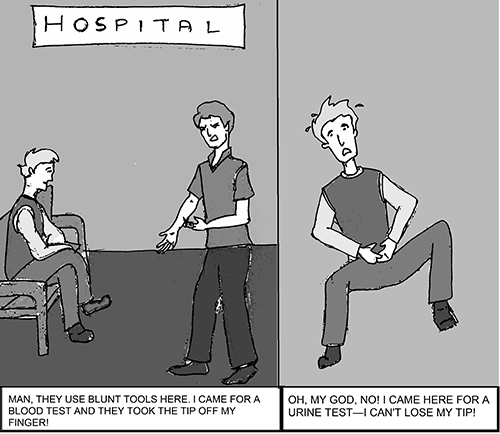Since January 2011, at least 82 violations have been reported in Oregon hospitals, according to a report by KATU News. These violations include a surgeon mistakenly operating on a child’s left eye instead of the right and a nurse accidentally connecting a nasogastric tube to oxygen instead of suction, sending the patient into cardiac arrest.
Oregon hospitals report errors

Since January 2011, at least 82 violations have been reported in Oregon hospitals, according to a report by KATU News. These violations include a surgeon mistakenly operating on a child’s left eye instead of the right and a nurse accidentally connecting a nasogastric tube to oxygen instead of suction, sending the patient into cardiac arrest.
One particularly, shall we say, image-inducing error occurred when a cleaning machine was reprogrammed to leave out the disinfectant cycle, which led to 18 patients receiving colonoscopies with scopes rinsed only in water and alcohol. Ugh.
I’ve heard people say that if you want to get sick, go spend some time in a hospital. With stories like these, I’m inclined to agree. Of course, where there are humans there will be error, so it shouldn’t be a surprise. But it makes me wonder what other things are happening in our halls of healing that we don’t know about.
Till now we’ve pretty much been in the dark. It’s the first time a report like this has been furnished to the public, as the U.S. Centers for Medicare and Medicaid Services released the inspection reports at the request of the Association of Health Care Journalists. The association then compiled the reports into a database now available for anyone to see. Does it really help, though, to read about it after the fact? Sometimes we have to wonder whether ignorance really is bliss.
What happens to the people making the mistakes? Apparently, it depends. According to the report, a Providence Medical Center employee photographed the “exposed buttocks of a patient” and emailed it around with a caption reading “pic of hairy ass.” The employee was promptly dismissed for that serious error in judgment. However, now we should all be more reticent to go to the gynecologist.
And what about Salem Hospital, where the parents of a 14-month-old were told that their child, who was coming out of anesthesia, was just “very sleepy,” when in fact, unbeknownst to them, the child had been “bagged”—yes, that scary artificial respiratory bag thing—for 20 minutes and given two doses of Narcon for “over-sedation”?
Very sleepy indeed.
The hospital’s administration said they “could have done a better job with the communication issue.” Ya think? They also said they made sure to “work with” their anesthesiologist and the rest of the staff. So, hairy-ass guy got fired but over-sedation person was just “worked with.”
Hmmm.
I’m not suggesting firing everyone. If I were fired for every mistake I made, I’d never keep a job. But when your job literally affects people’s lives the responsibility is
much different.
Holding health care workers legally liable for errors is not the answer, but if I were the parent of that child and wasn’t told she’d just been resuscitated I’d be livid. I’d want answers and wouldn’t want to have to wait to read about it in a report. That’s probably the most concerning aspect of all this.
Yes, mistakes happen, but when they’re covered up they become infinitely more dangerous. Who knows what residual effects the child may experience in the future, and the parents would have been none the wiser. Deceit should be met with immediate consequences, coverups with zero tolerance. You can’t play with people’s lives.
According to KATU, a hospital doesn’t get fined for violations but the “federal government can terminate a hospital’s Medicare agreement if it does not correct problems.” If there wasn’t a risk of termination, would there be any changes? The impetus to correct them shouldn’t be the federal government breathing down their necks. Hospitals should have their own methods of maintaining standards regardless of an agreement with Medicare. That should be a second or third layer of accountability.
If the Association of Health Care Journalists had never provided the public with this information, you’d have to wonder if hospitals would have been as quick to respond and fix things.
I don’t want to find out. I’ll keep eating my apples, thank you very much, and hopefully staying far, far away from those antiseptic halls teeming with germs and camera-happy
employees.






